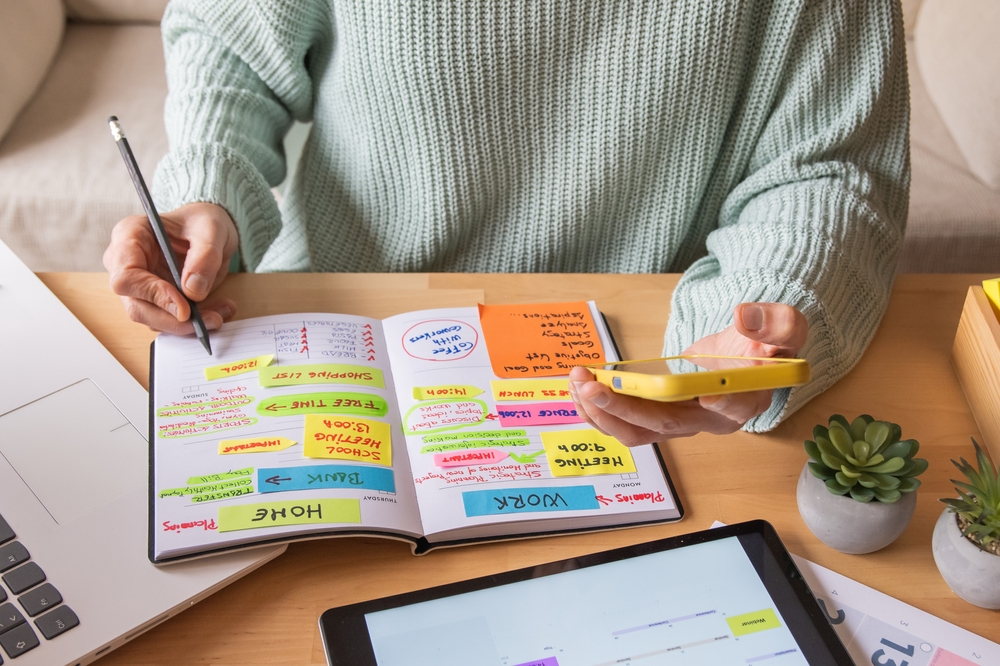Daily life can be difficult to keep up with. It moves by in a blur with endless responsibilities in your work and personal life, with barely any escape from them all due to technology. Advanced technology is a huge part of everyone’s lives as it can assist every single aspect, from managing workload to communicating with loved ones. Due to this, your daily routine can also be endless pings of notifications that feel like they never stop, which can add to the stress you face every day and create a whirlwind of non-stop stress. It’s easy to feel as though you are always on the go, juggling every part of your life and struggling to balance everything. Time can slip through your fingers, and you can create a messy schedule that’s trying to do everything all in one go, juggling work, family, health and personal growth. With so much to do in so little time, you can often reach the end of the day and wonder where all the time went?
Having a hectic schedule that adds more stress to your life and makes it difficult to manage your time can lead to feelings of burnout, anxiety, depression and other negative emotions that can leave you feeling exhausted. But there are simple ways you can turn this around and get back on track, giving you the ability to prioritise your tasks and manage your time. To do this, you need to implement effective time management strategies to get on top of your responsibilities and even have time to put yourself first. Effective time management isn’t about trying to squeeze more tasks into your day. Instead, it focuses on creating routines that reflect your values, priorities and energy. If you learn to manage your time wisely, you can bring back that sense of calm and purpose that makes life feel fulfilling and truly worth it!
Start by Understanding Your Priorities
You can’t just suddenly start managing your time effectively. It takes work and dedication to get into easy-to-manage routines that prioritise your tasks and leave you with plenty of time to complete them. Before you can begin this journey of getting on top of your daily life, you need to have clarity. To do this, you need to understand your priorities and know exactly what matters to you the most. This is essential to figure out because, without it, you can’t plan your days out efficiently. Take a moment to reflect on your goals, whether personal or professional. Are you spending your energy on what actually brings value to your life, or are you constantly reacting to external demands? When your priorities are clear, it becomes easier to make decisions that support balance rather than chaos.
A huge part of understanding your priorities is figuring out what in your day deserves your time. It has to serve a purpose for you, such as achieving a value or putting you on the path to success. If it doesn’t serve a purpose that helps you grow as a person, then it’s probably not worth your time. This means that you need to learn to say no to the tasks that don’t serve you. Sure, this can be hard at first, especially if you’re usually a yes person and want to do the most you can for someone or something. But you have to push yourself out of that uncomfortable stage and get used to saying no. When you do this, you can start to recognise that saying no to something that isn’t that important to you is basically saying yes to something much more meaningful. Protect your calendar and treat it as a reflection of your values because, in many ways, it is!
Create Routines That Support Your Wellbeing
Once you fully understand what you value in your life, you need to start planning a structured routine that supports your wellbeing. This is the backbone of excellent time management and can be the difference between struggling to juggle everything and having plenty of time to complete tasks in your day – with even some time to yourself! Having a routine that you can turn into a habit over time can really get you back on top of your life and in control. Humans thrive on a scheduled routine because it allows the mind to focus and the body to relax due to the predictability of every day. Due to this, you need to establish simple habits and ingrain them into your daily schedule, so that you can get used to them and eventually carry them out automatically. This could be as simple as creating a morning routine or an evening wind-down to help structure your day and provide time to yourself.
It’s also important to remember when creating your everyday habits that you don’t have to fill every minute with productivity. You need to balance productivity with wellness to truly make your daily schedule effective. Leaving space for rest and spontaneity boosts your overall health and can make you much more productive. Think of your daily schedule as a framework rather than a fixed structure. Allow flexibility for unexpected changes while maintaining a consistent foundation. For instance, dedicating specific hours to deep work, meals, exercise and sleep can reduce decision fatigue and make your day flow more naturally.
Learn to Work with Your Energy, Not Against It
You can’t manage your time properly if you’re not working with your energy patterns. Trying to get on top of everything in your day while ignoring your personal energy levels can lead to more stress and frustration, creating a chaotic mess that you just can’t handle. You need to take notice of your energy level patterns every single day and create your daily schedule around this. It’s important to recognise that not all the hours in the day are created equal, and so you need to dedicate your most productive times in the day to important tasks and your less productive times for relaxation. You could be a morning thinker that is bursting with creativity after sunrise or your energy may come later on in the day, gaining ideas and motivation as the hours go by. Whichever person you are and whatever time your energy comes; you need to work with it by scheduling the demanding tasks during your peak energy hours. For the other hours before and after your peak energy time, you should schedule lighter activities and relaxation.
Plan Ahead Without Overloading Your Future
Achieving a balanced life comes from planning ahead with intention. Now, this doesn’t mean you need to go overboard and plan every little detail of your future because this can be overwhelming. Instead, it’s about thinking about your main goals and values that you want to achieve in your future. It’s also not about spending hours thinking about your future because this can lead to stress and anxiety about something you can’t control in that moment. Planning should be spread out across every morning or evening and should only last for a few minutes. In this short time, you should outline the key things you want to do and achieve in the future. This needs to be carefully considered as they need to still serve a purpose for you and help you grow as a person. It’s all about focusing on the essential, not the endless. If you over plan, you can create unnecessary pressure, but if you don’t plan enough, then you can end up in chaos.
This is also a good time of year to think about how upcoming events may affect your schedule. For instance, many people plan family activities, travel, or periods of reflection around significant occasions. Knowing when is Ramadan 2026 can help those who observe it organise their days with mindfulness and purpose, ensuring their time aligns with both spiritual and personal goals.
Accept That Balance Is an Ongoing Process
Time management is not a one-time fix; it’s a lifelong practice. Life changes constantly, so your responsibilities evolve, your energy shifts, and your priorities transform. What worked a year ago may not work today. The key is to regularly check in with yourself and make adjustments as needed. Balance is less about perfection and more about awareness.
Keep an eye for more latest news & updates on Touchcric!

